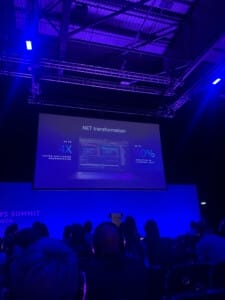30th April saw the return of the annual AWS Summit in London, the largest free cloud technology event in the UK and a day dedicated to celebrating the latest in cloud innovation – from generative artificial intelligence to serverless computing.
Our commercial director Dom Deacon, cloud consultant Geordie Kingsbeer, and client services manager Kat Plant joined 24,000 other attendees ready to learn about the technologies that are revolutionising industries and empowering SaaS startups and scale-ups to lead in the digital era.

Here are six key takeaways from the event…
- Generative AI becomes mainstream
It came as no surprise that artificial intelligence was a central theme at this year’s conference, with AWS showcasing tools like Amazon Bedrock and Amazon Q to simplify and accelerate AI adoption across industries. These services are designed to lower the barrier to entry for businesses eager to harness the power of generative AI – without requiring deep expertise in machine learning.
Amazon Bedrock allows firms to build generative AI applications using pre-trained models from top AI providers – all through a single API and without managing any infrastructure.
Amazon Q, AWS’s new AI-powered assistant, stood out as a major development. It is now integrated across key AWS services to support cloud operations, application development, and data analytics – making it useful for both technical and non-technical teams.
This shift toward accessible, embedded AI tools signals real opportunity:
- Faster project delivery. Tools like Amazon Q could dramatically accelerate design, documentation, and development workflows, helping IDS deliver builds more efficiently.
- Operational efficiency for clients. AI-driven automation will enable clients to gain faster insights, streamline processes, and reduce resource drain.
- Stronger value proposition. Leveraging these capabilities helps IDS offer smarter, more adaptive solutions from day one – a real differentiator in a competitive market.
It was clear from the summit that generative AI is moving rapidly from experimentation to everyday business use.
- Sustainability through Cloud innovation
AWS emphasised its growing commitment to sustainability, highlighting how cloud adoption can help organisations reduce their environmental impact. By moving workloads from on-premises data centres to the cloud, businesses can benefit from reduced energy consumption and shared infrastructure optimised at scale.
A standout example is AWS Graviton – a family of energy-efficient processors that deliver better performance per watt than traditional processors. By adopting Graviton-based instances, companies can lower costs and emissions simultaneously.
- Cost optimisation as a continuous strategy
With economic pressures still top of the agenda for many organisations, AWS sessions encouraged treating cost optimisation as more than a one-off initiative, but a continuous mindset.
Key strategies included proactive monitoring, rightsizing resources, and using services like EC2 Spot Instances – which leverage spare capacity at lower rates – and Elastic Kubernetes Service (EKS) for efficient container management.
The message was clear, smart cloud usage isn’t just about performance – it’s about building long-term financial resilience.
- Empowering the next generation
AWS reaffirmed its commitment to bridging the skills gap with a bold goal – training 25 million people in cloud skills by 2025. This includes initiatives like AWS GetIT, a programme designed to engage school-aged students – especially girls and underrepresented groups – in exploring careers in tech through hands-on cloud learning.
By investing in this digital education and outreach, AWS is helping to cultivate a more inclusive, skilled and future-ready global workforce.
- Data strategy as the foundation for AI success
A recurring message at the summit was that AI is only as powerful as the data behind it. To unlock the full potential of generative and predictive AI, businesses must prioritise well-structured, high-quality data.
- Serverless and containerisation advancements
The summit also showcased continued innovation in serverless computing and containerisation, aimed at helping developers build and scale applications more efficiently.
Updates included support for additional programming languages in AWS Lambda, making it easier for teams to work with the tools they already know. There were also improvements in deploying containerised apps via AWS Fargate and EKS, reducing operational overhead and accelerating time to market.
These advancements allow teams to move faster, scale smarter, and focus on building great products – not just managing infrastructure.
Looking ahead
The AWS Summit London 2025 highlighted just how quickly cloud technologies are evolving – and the transformative potential they hold for organisations of all sizes.
From generative AI and sustainability to smarter cost management and next-generation talent development, the innovations on display point to a future where agility, efficiency, and intelligence are key to digital success.
At IDS, we’re excited about the role we play in supporting businesses on this journey. We’re proud to help startups, scale-ups, and established companies harness the full power of AWS. Whether it’s implementing AI tools, optimising cloud spend, or scaling with serverless architecture, we’re here to help build smarter, future-ready infrastructure.






